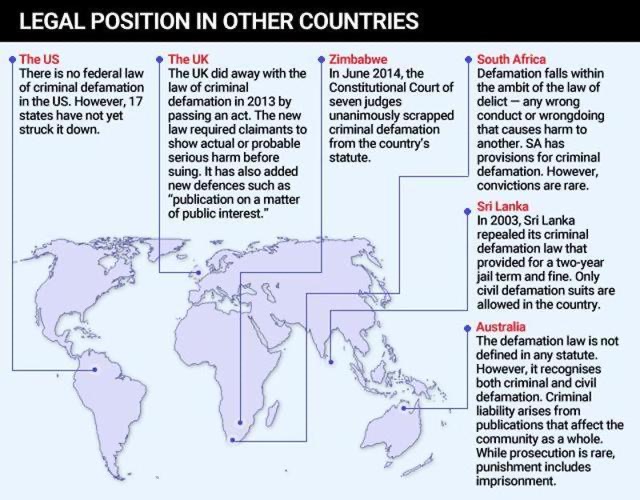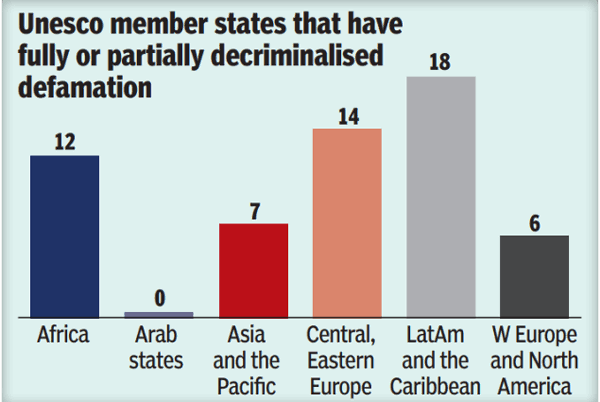ForumIAS announcing GS Foundation Program for UPSC CSE 2025-26 from 19 April. Click Here for more information.
ForumIAS Answer Writing Focus Group (AWFG) for Mains 2024 commencing from 24th June 2024. The Entrance Test for the program will be held on 28th April 2024 at 9 AM. To know more about the program visit: https://forumias.com/blog/awfg2024
Contents
- 1 Introduction
- 2 What is Criminal defamation?
- 3 What is the need for Criminal defamation in India?
- 4 What are the laws regulating Criminal defamation in India?
- 5 What are the judicial interventions on Criminal defamation in India?
- 6 What are the challenges associated with Criminal defamation in India?
- 7 What should be done?
| For 7PM Editorial Archives click HERE → |
Introduction
The Surat court has sentenced the Congress leader and a Member of Parliament was sentenced with two years jail term in a 2019 defamation case. The court also granted him bail and suspended his sentence for 30 days to allow him to appeal. The conviction has led to questions over his status as a Member of Parliament, but there are wider concerns about the laws regarding criminal defamation in India and its impact on free speech.
What is Criminal defamation?
Criminal defamation is a type of crime where a person makes a false statement about someone else that harms their reputation and does so intentionally or with reckless disregard for the truth. This false statement must be communicated to others, either in writing or verbally.
| Read more: What is Criminal Defamation |
What is the need for Criminal defamation in India?
There are several reasons why Criminal defamation is considered necessary in India. Here are some of them:
Protecting Reputation: Defamation laws, including criminal defamation, exist to protect the reputation of individuals from false and baseless attacks that can cause significant harm to their personal and professional life.
Deterrence against false news: Criminalising defamation serves as a deterrent against people who might want to spread false information and rumours with malicious intent.
Preventing public disorder: Defamation laws can prevent public disorder by ensuring that false information doesn’t incite violence or cause unrest.
Fairness: Defamation laws provide a legal remedy for individuals who have been defamed, allowing them to seek justice and clear their name.
Promoting social cohesion: Defamation laws promote social cohesion by maintaining social norms and moral values that support the peaceful coexistence of different groups in society.
| Read more: How can an MP be disqualified and How does an appeal against the conviction impact disqualification? |
What are the laws regulating Criminal defamation in India?

In India, Criminal defamation is regulated by the following laws:
Indian Penal Code (IPC): Sections 499 and 500 of the IPC define defamation as a criminal offence.
Code of Criminal Procedure (CrPC): This law outlines the procedure for prosecuting criminal offences, including criminal defamation.
Indian Evidence Act: This act outlines the rules for presenting evidence in court, including in cases of criminal defamation.
Information Technology Act (IT Act): This act includes provisions related to online defamation and cybercrime, which can be used to prosecute cases of criminal defamation that occur on the internet.
Right to Information Act (RTI Act): This law allows citizens to access government records and information, which can be used to gather evidence in cases of criminal defamation.
These laws work together to provide a legal framework for prosecuting cases of criminal defamation in India. Individuals who have been defamed can seek legal remedy through either civil or criminal defamation, or both, depending on the circumstances of the case.
| Must read: Criminalisation of government criticisms: Laws and issues |
What are the judicial interventions on Criminal defamation in India?
Constitutionality: In the Subramanian Swamy v. Union of India case, the Supreme Court upheld the constitutionality of criminal defamation laws in India, stating that they are necessary to protect the reputation of individuals.
Right to free speech: The Supreme Court has also recognized that the right to free speech and expression is important, but it is not absolute and must be balanced with the right to reputation.
Interpretation of provisions: The courts have interpreted the provisions of criminal defamation laws, such as what constitutes a “public setting” and the scope of the defences available to the accused.
Remedies: The courts have provided remedies for those who have been defamed, including compensation and punishment for the offender. For example, In Arun Jaitley v. Arvind Kejriwal case, the Delhi High Court held that the statements made by Arvind Kejriwal against Arun Jaitley were defamatory and ordered him to pay damages.
Fair criticism: In the Ram Jethmalani v. Subramanian Swamy case, the Supreme Court held that there is a difference between fair criticism and defamation, and that criticism is not defamation unless it is made with the intent to harm the reputation of the person.
Social media: The courts have also addressed cases of criminal defamation on social media and the internet, including the responsibility of intermediaries like social media companies.
Overall, the judicial interventions on criminal defamation in India have been aimed at balancing the right to free speech with the need to protect an individual’s reputation. The courts have also addressed the evolving nature of defamation in the digital age and provided guidance on how to handle cases of online defamation.
| Read more: Sedition law in India: Arguments for and against- Explained, pointwise |
What are the challenges associated with Criminal defamation in India?
Effect on free speech: The use of criminal defamation laws can have a chilling effect on free speech, as individuals may be hesitant to express their opinions or criticisms for fear of being accused of defamation.
Misuse of laws: Criminal defamation laws can also be misused by powerful individuals or institutions to silence their critics and suppress dissent.
Delayed justice: Criminal defamation cases can take a long time to resolve in India’s overburdened court system. This can lead to delayed justice and harm to the reputations of those involved.
The burden of proof: The burden of proof in criminal defamation cases lies with the accused, which can make it difficult to defend oneself against false allegations.
Vagueness of laws: The provisions of criminal defamation laws in India, including what constitutes a “public setting” and the scope of the defences available to the accused, can be vague and open to interpretation.
What should be done?

Repealing or amending criminal defamation laws: Repeal or significantly amend Sections 499 and 500 of the Indian Penal Code (IPC), which currently criminalise defamation and provide for imprisonment and fines as punishment. This could include redefining what constitutes defamation or limiting the scope of criminal penalties.
Promoting alternative dispute resolution: Encouraging parties to resolve defamation disputes through alternative dispute resolution mechanisms, such as mediation or arbitration, could help reduce the burden on the court system and provide a quicker resolution for all parties involved.
Providing clearer guidance on interpretation: Providing clearer guidance on the interpretation of criminal defamation laws could help to reduce the vagueness of the provisions and ensure a more consistent application of the laws.
Increasing awareness and education: Increasing awareness and education on the consequences of defamation, both for the accused and the victim, could help to reduce the incidence of defamation and promote more responsible speech.
Improving the legal process: Improving the legal process for criminal defamation cases, such as by reducing delays and ensuring a fair trial, could help to promote justice and protect the rights of all parties involved.
Promote media literacy and ethical journalism practices: It will help to reduce the incidence of false or defamatory reporting.
Engage in dialogue: Engage in dialogue with civil society groups, legal experts, and media professionals to ensure that any reforms to defamation law reflect the interests and values of the Indian people.
| Read more: Shooting messengers: Criminal defamation must go from IPC. Effective civil libel law is enough for protecting reputations |
Sources: The Hindu (Article 1 and Article 2), Indian Express (Article 1 and Article 2), Times of India (Article 1 and Article 2) and Hindustan Times
Syllabus: GS 2: Indian Constitution and Polity – Parliament and State legislatures—structure, functioning, conduct of business, powers & privileges.




